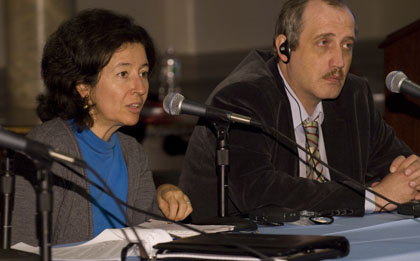
Impunity Summit: Solidarity in fighting journalist murders
Every day at CPJ, we count numbers: 18 journalists killed in Russia since 2000, 32 journalists and media workers slaughtered in the Maguindanao massacre, 88 journalists murdered over the last 10 years in Iraq. But on Tuesday night at CPJ’s Impunity Summit at Columbia University, CPJ Executive Director Joel Simon clarified why we were gathered:…
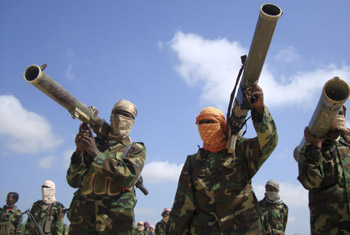
Getting Away With Murder
CPJ’s 2010 Impunity Index spotlights countrieswhere journalists are slain and killers go free New York, April 20, 2010—Deadly, unpunished violence against the press has soared in the Philippines and Somalia, the Committee to Protect Journalists has found in its newly updated Impunity Index, a list of countries where journalists are killed regularly and governments fail…
Fighting impunity with solidarity, unity, and a symbol
We will not make significant advances in the battle against crimes against journalists and the impunity surrounding them without the creation of a sense of unity and solidarity among a country’s news media and journalists. Nor will the cause advance without a strategy by international press freedom organizations to provide support for those two values.
Audio Report: Getting Away With Murder
In our special report, “Getting Away With Murder” CPJ names and shames countries where journalists are killed regularly and governments are unable or unwilling to solve the crimes. Here, María Salazar-Ferro explains CPJ’s Impunity Index, detailing what nations are failing and which ones are showing improvement. Listen to the mp3 on the player above, or…

Colombian journalist shot dead by unidentified gunman
New York, March 22, 2010—The Committee to Protect Journalists urges Colombian authorities to fully investigate the death of journalist Clodomiro Castilla Ospino, left, who was shot on Friday by an unidentified gunman in the northern city of Montería, according to local press reports.
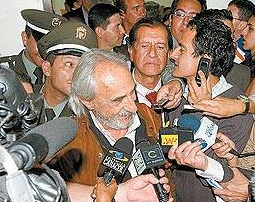
Latin America takes steps against criminal defamation
In an encouraging development, three courts in Colombia, Costa Rica, and Chile have recently followed the growing regional consensus against criminal defamation by dismissing criminal penalties against journalists accused of libel and slander.The newsweekly magazine Semana reported that a piece written by Alfredo Molano, at left, in the op-ed pages of the Bogota-based daily El Espectador in February 2007 described how…
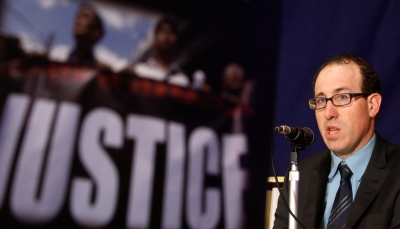
CPJ launches yearly findings globally, and is heard
On February 16, CPJ held an ambitious international launch of our annual report Attacks on the Press. We coordinated events in six cities on four continents in order to expand the reach of our international headlines while also focusing on specific issues in each region. So how did we do?

Uribe to CPJ, FLIP: ‘Illegal spies are enemies of Colombia’
Bogotá, February 17, 2010—Colombian President Alvaro Uribe Vélez said on Tuesday that those who illegally spy on the press are “enemies of his government” during a meeting with a delegation from the Committee to Protect Journalists and the Foundation for Freedom of the Press (FLIP). Uribe issued the statement at the urging of the CPJ and…
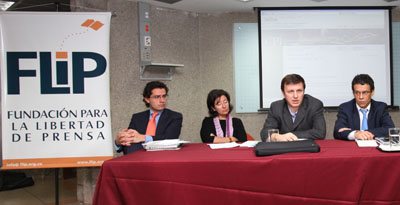
Colombian government tells CPJ it ‘rejects’ illegal spying
Shortly after arriving in Bogotá to launch Attacks on the Press, I realized the Colombian government was well aware of our concerns about illegal espionage against the media. Top government officials, including President Alvaro Uribe Vélez, had confirmed meetings with a delegation from CPJ and the local press freedom group Foundation for Freedom of the…
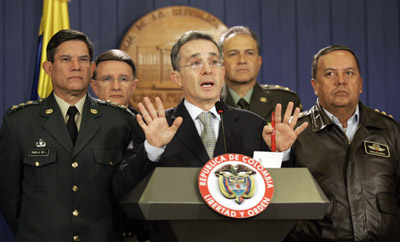
In the Americas, Big Brother is watching reporters
By Carlos Lauría The topic being investigated by two Colombian reporters was explosive enough that it required unusual security. Fearful that the subjects would learn prematurely of the story, the reporters took separate notes, which they did not share and which they later destroyed. They didn’t communicate by telephone or e-mail, and they met only…